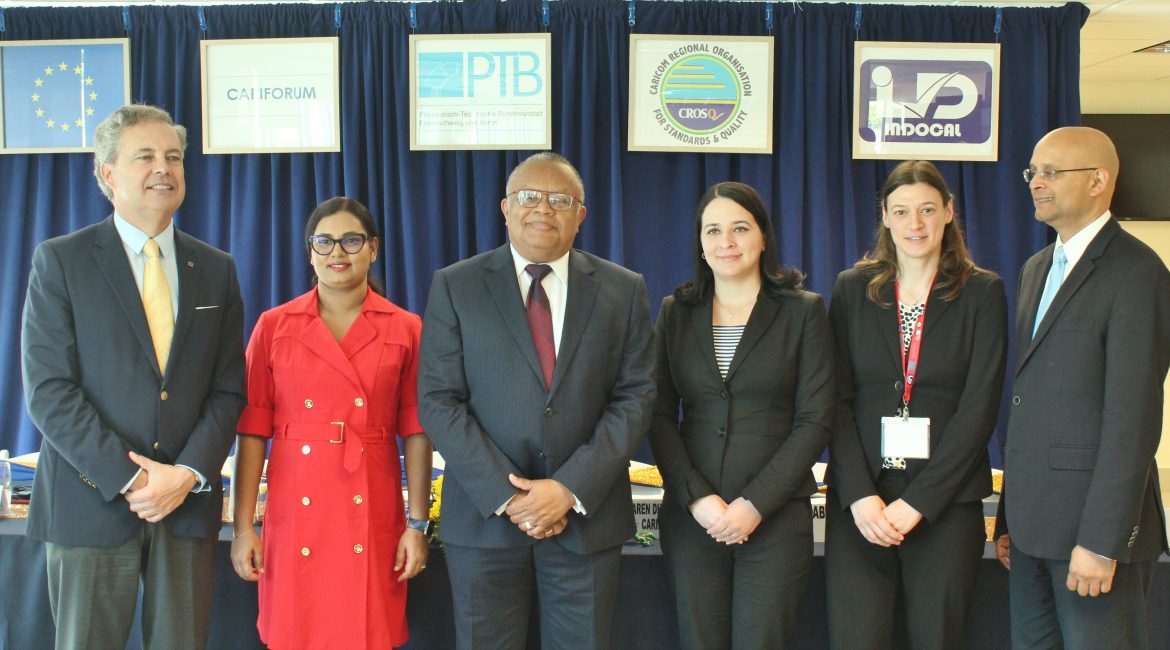The Caribbean Region’s latest quality-related project is looking to take as much advantage of the European Union-CARIFORUM Economic Partnership Agreement (EPA).
The newest project, under the 11th European Development Fund (EDF) EPA Programme’s Technical Barriers to Trade (TBT) Component, is aiming to find and close the existing quality gaps in key sectors, value chains and organisations; bring greater awareness to the region about quality, and the strengthening of regional quality institutions. It is being managed by the German National Metrology Institute and implemented in the region by CROSQ and the Dominican Republic’s quality institution, INDOCAL.
In addressing his hopes for the 11th EDF EPA TBT, Head of Cooperation with the European Union Delegation to Barbados, the Eastern Caribbean States, the OECS and CARICOM/CARIFORUM, Mr. Luis Maia noted that despite the 10 year existence of the EPA in the region, there were still gaps to fill.
“That we have not achieved the EPA’s full potential is more than evident, but the focus should be on the why, the how, and the when. Taking responsibility, and then corrective action, is the only way to address the necessary, but not always easy steps that a trade agreement requires,” he stated.
Mr. Maia assured those gathered in Barbados for the launch that the EU wanted the EPA to work for the Caribbean and were putting in efforts towards that end.
His comments came moments before Barbados’ Minister of Foreign Affairs and Foreign Trade, Senator Dr. Jerome Walcott made similar observances about the challenges of the EPA and its benefits for regional trade.
Dr. Walcott posited that he was at pains to note the lack of expected gains for the region as had originally been envisaged from the signing of the EPA. There was however no single cause, he quickly noted, but a plethora of issues stemming from these developing countries size, vulnerability and other capacity constraints.
Nevertheless, he praised the successful results of the 10th EDF CRIP EPA TBT Programme which came to a close in 2018, for “the progress made towards creating a modern quality infrastructure, according to internationally recognise principles, for the region.”
He singled out the development and operationalisation of regional frameworks for the various quality areas, including standardisation, metrology, conformity assessment and accreditation; as well as the harmonisation of standards and procedures, and the development of capacities of national bureaux of standards across the region.
“The world is moving ahead and with continued pressure from consumers, technical barriers to trade will continue to emerge. We must persevere. We must think outside the box. In order to do so, however, we must take on board the concerns of our consumers and realise the importance of competition,” he stated.
CEO of CROSQ, Mr. Deryck Omar highlighted that the 11th EDF-EPA TBT Programme had set out to accomplish a number of targets towards making the region more competitive. Among these:
- The development of standards
- Interventions in key value chains
- Accreditation and certification scheme
- Upgrading and accreditation of laboratories and other quality institutions, and
- Education of the general public and business sectors.

